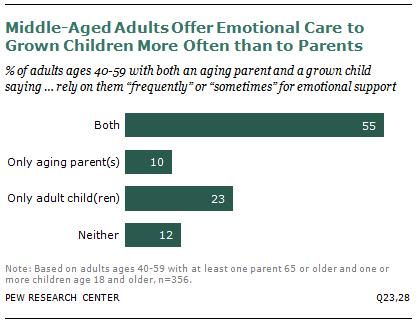
While some middle-aged adults are providing financial support to aging parents and grown children, even more are providing emotional support. Among adults in their 40s and 50s with at least one parent age 65 or older and one or more grown children, 55% provide emotional support to both their aging parents and their grown children. One-in-ten provide this support to just a parent, and a significantly larger share (23%) provide it to just a grown child. Only 12% of middle-aged adults with grown children and aging parents do not say they at least sometimes provide emotional support to either.
Overall, 68% of all adults with parents age 65 and older say their parents depend on them frequently or sometimes for emotional support, and 76% of all adults with children age 18 and older say the same of their children. Among all adults in their 40s and 50s, the shares are similar to the general population’s (66% and 80%, respectively), though this age group has a higher share of adults who have both aging parents and grown children.
Emotional Ties with Aging Parents
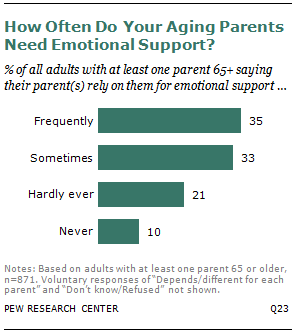
About a third (35%) of all adults with at least one parent age 65 or older say at least one parent relies on them “frequently” for emotional support. Another third (33%) says their parent relies on them “sometimes.”
Women with an aging parent are more likely than men to say their parent relies on them for emotional support on a frequent basis. Four-in-ten women (39%) say this, compared with three-in-ten men (30%).
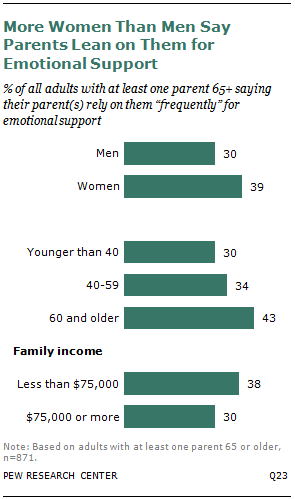
Older adults—who are more likely to have older parents—are more likely than younger adults to say their parent requires frequent emotional support. Among adults ages 60 and older with at least one elderly parent, fully 43% say this, compared with 30% of adults younger than 40. Among middle-aged adults with a parent age 65 or older, about a third (34%) say their parent often depends on them emotionally.
Just as with practical and financial caregiving, adults whose family income is below $75,000 are more likely than those with higher incomes to have lent emotional support to an aging parent (38% vs. 30%).
Also similar to other types of caregiving, the older one’s parents, the more likely adults are to be providing them with emotional care. Among adults in their 40s and 50s, those with at least one parent age 80 or older are much more likely than those with parents ages 65 to 79 to say their parent relies on them frequently for emotional support (47% vs. 28%).
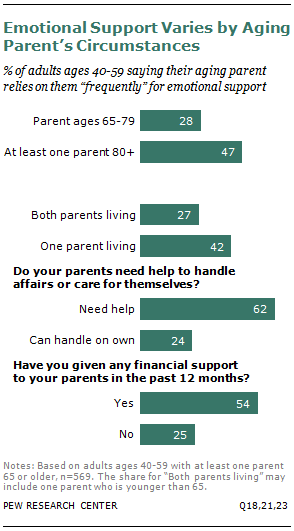
The need for emotional support also differs based on whether both parents are still living. Among middle-aged adults for whom both parents are still living, 27% say their parents rely on them for frequently emotional support, while 42% of those with only one living parent say the parent relies on them that often.
Finally, the three types of care – practical, financial and emotional – are closely tied. About six-in-ten middle-aged adults (62%) who say their parents need help to handle their affairs or care for themselves also say their parents rely on them for emotional support on a frequent basis, compared with 24% of adults who say their parents can handle things on their own. And among those who have given their parents financial support in the past 12 months, 54% say they give emotional support frequently, compared with 25% of those who say they didn’t give money to their parents.
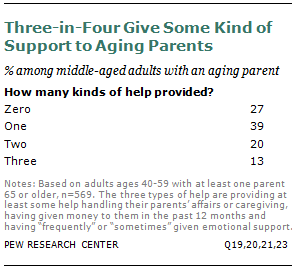
Overall, 13% of adults ages 40 to 59 with aging parents provide all three kinds of assistance—that is, they provide at least some help handling the parent’s affairs or caregiving, have given money to them in the past 12 months and have “frequently” or “sometimes” given emotional support. Two-in-ten adults in their 40s and 50s have provided two of the three kinds of assistance to their aging parents, and 39% provide one of the three services for their parents. About a quarter (27%) of adults with a parent age 65 or older say they don’t provide practical, financial or emotional care for their parents.
Emotional Ties with Grown Children
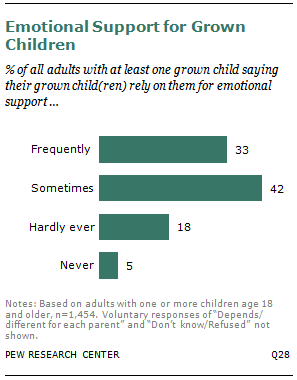
When it comes to emotional support, grown children are more dependent than aging parents. Among adults ages 40 to 59 with both grown children and aging parents, 78% say their grown children rely on them “frequently” or “sometimes” for emotional support, while 65% say the same about their aging parents.
Overall, a third of all adults with at least one child age 18 or older say their child relies on them for emotional support on a frequent basis, and 42% say their child relies on them sometimes. Only about a quarter (23%) say their child “hardly ever” or “never” relies on them for emotional support.
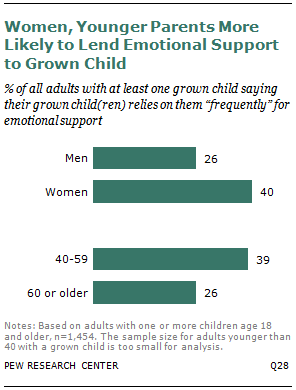
As with emotional support for aging parents, women are more likely than men to say their grown children turn to them for emotional support. Some 40% of women say they frequently provide emotional support to a grown child, compared with 26% of men. Men are much more likely to say they “hardly ever” or “never” emotionally support their grown children compared to women (29% vs. 18%).
Middle-aged parents of grown children—who are more likely to have children just entering adulthood—are more likely than older parents to say they frequently help their grown children with emotional support (39% vs. 26%). The survey does not provide enough detail to look at support based on the precise age group of the children, as it does with aging parents.
Adults who have provided some financial support to their children over the past 12 months are also more likely to say their child frequently depends on them for emotional support (see table on page 27). About four-in-ten (43%) parents ages 40 to 59 who provided either primary or some financial support over the past 12 months say their child also frequently depends on them for emotional support. About three-in-ten (29%) parents who did not provide any financial support to their children over the past year say the same.
How Close Are Parents to Their Grown Children?
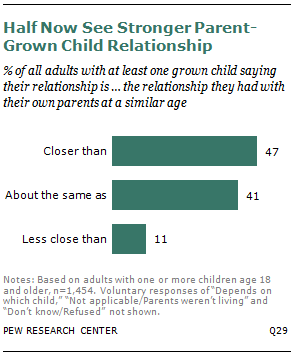
About half of all adults with a grown child say their relationship with their children is closer than the relationship they had with their own parents at a comparable age. An additional 41% say their relationship is about the same as the one they had with their parents. Only 11% say their relationship with their own children is less close than the relationship they had with their parents.
Women are more likely than men to say the relationship they have with their grown children is stronger than the relationship they had with their parents (52% vs. 41%), while men are more likely than women to say their relationship is less close (16% vs. 6%). Men and women are equally likely to say the parent-grown child relationship has not changed much (41% and 40%, respectively).
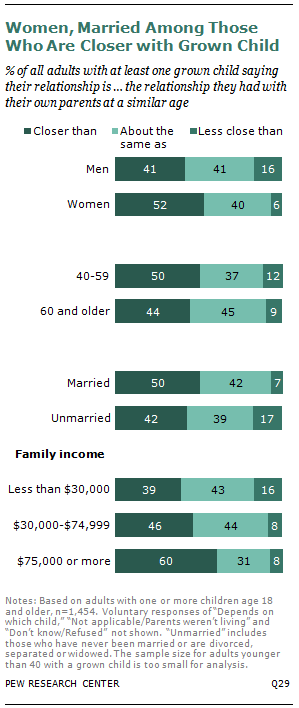
In addition to lending more frequent emotional support, middle-aged parents are also more likely than those ages 60 and older to see an improvement in the relationship with their children compared with their own upbringing (50% vs. 44%). However, they are also slightly more likely than older parents to see a decline in the parent-grown child relationship (12% vs. 9%), while older parents (45%) are more likely than younger parents (37%) to see little change over the generations.
Among those with at least one child age 18 or older, married parents (50%) are significantly more likely than unmarried parents (42%) to say that their relationship with their children is closer, while unmarried parents (17%) are more likely than married parents (7%) to say their relationship is less close.
Parents with annual family incomes of $75,000 or higher are particularly likely to report improved relationships with their own grown children—60% of adults with family incomes higher than $75,000 say their relationship is better than the one they shared with their parents, compared with 39% of people with incomes lower than $30,000. Among those who fall between these two income ranges, 46% say their relationship is better than their relationship was with their parents. Furthermore, those at the lower end of the income scale (16%) are more likely than those in the middle (8%) or higher end (8%) to say their relationships is less close than the one they shared with their parents.
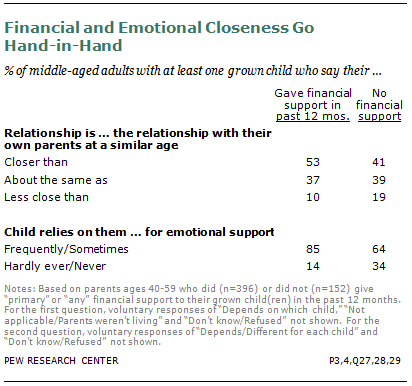
Middle-aged parents who are providing financial support to their children say they experience more emotional closeness with their grown children than their parents did with them. Some 53% of parents ages 40 to 59 who gave financial support to their grown child in the past 12 months see an improvement in their relationship with their grown children over their own relationships with their parents at a similar age. This share is 41% among middle-aged parents who did not provide monetary support to their grown children. And those who didn’t provide financial support are more likely to say they are less close with their children than their parents were with them (19% vs. 10% among those who gave support).
“Can I Talk to Mom?”
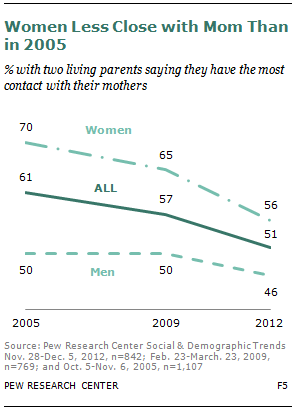
People with two living parents are much more likely to say they have more contact with their mother than with their father. Half (51%) of adults say they are closer with their mother, while only 15% say they are closer with their father. About a third of adults (34%) say that they have equal contact with both parents.
However, the share saying they have the most contact with mom has dropped over the past several Pew Research surveys. In early 2009, 57% of adults said they had the most contact with their mother and in late 2005, 61% said this. The share saying they have equal contact with their parents is up from 2005, when only 21% said this.
While women are still more likely than men to list their mother as the parent they are closer to (56% vs. 46%), the decrease in the share of women choosing mom over dad in the past seven years has been the sharpest. In 2012, 56% of women said this, down from 70% in 2005. The share of men saying their mother was their closer parent is similar in 2012 (46%) and 2005 (50%).
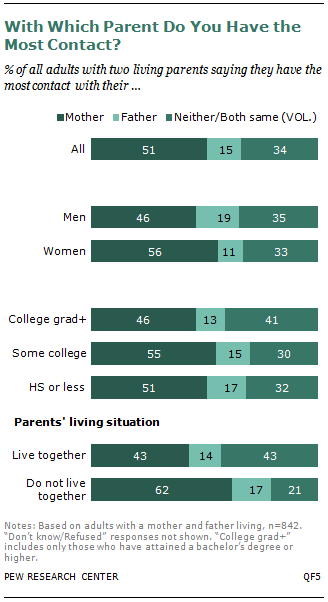
For both men and women, the share saying they have equal contact with their parents has increased. A third of women now say this, up from 18% in 2005; about a third of men (35%) also say this now, up from 25% in 2005.
College grads (41%) are more likely than those with some college education (30%) or a high school diploma or less (32%) to say that they have equal contact with their parents.
Not surprisingly, among those whose parents live in the same household, the share saying they have equal contact with both parents is higher than among those whose parents are not living together. Fully 43% of adults whose parents live together say this, compared with 21% of adults whose parents live apart from each other. Among adults with parents who are not living in the same household, the mother is overwhelmingly the closer parent, with 62% saying they have more contact with their mothers, compared with 17% saying they have more contact with their fathers. Among those whose parents live together, 43% say they are closer with their mother and 14% say they are closer with their father.




